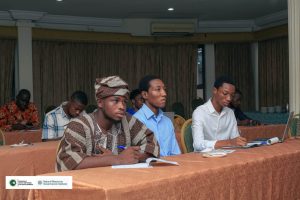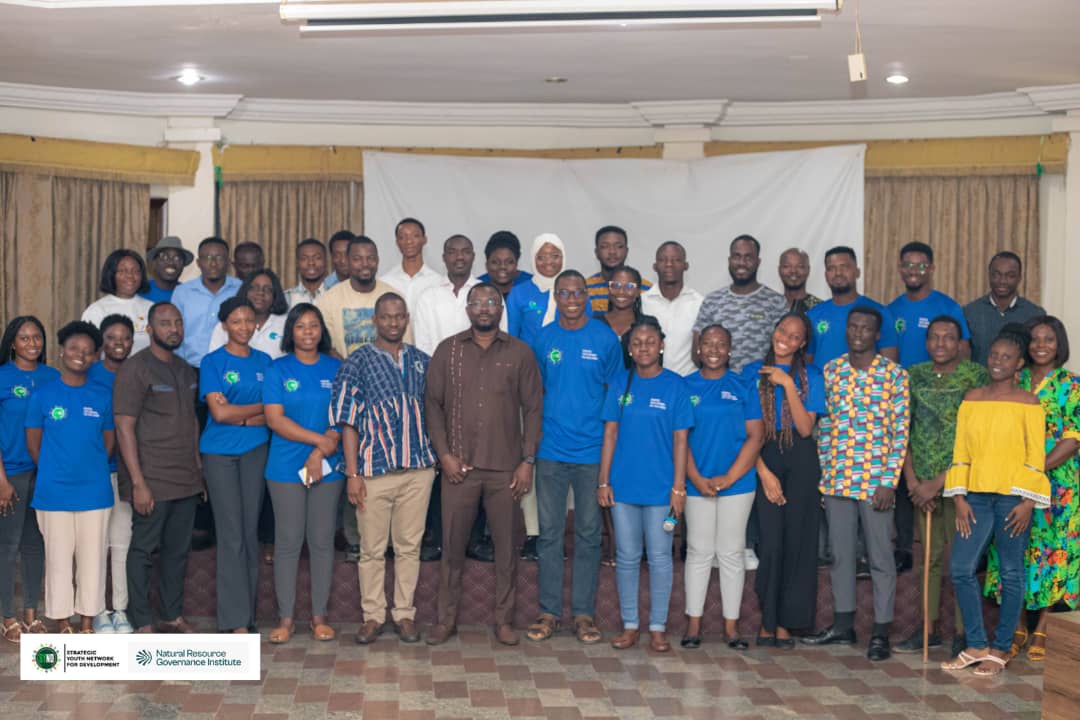
Group picture of participants & Dr. Robert Sogbadji
Story by: Ishmael Barfi
To avoid dire financial consequences on local economies, broader and deeper consultation has been called for regarding Ghana’s National Energy Transition Framework.
The call was made by young people in renewable energy space at a day’s youth participation in energy transition and domestic resources mobilization workshop organized by the Strategic Youth Network Development (SYND) on Thursday, 18th August, 2023 in Accra.
The conference brought young people in the Climate/Energy space to interact as well as be abreast with government policies towards the country’s National Energy Transition Framework (2022-2070).
The Framework presents a set of long-term policy recommendations to help Ghana achieve its Nationally Determined Contributions (NDCs) commitment by decarbonizing the energy sector and reaching net-zero emissions by 2070 while ensuring socio-economic growth and using Ghana’s natural resources.

Some young participants at the conference
According to the young participants, the energy transition model used by developed countries could not be used for African countries that were still struggling to grow hence the need to have a suitable model for African developing countries such as Ghana.
Energy transition they noted was important as the whole world was moving towards that, Ghana can not be left out but was quick to explain that, there were a lot of implications in the quest to move towards cleaner energy.
In his presentation, Dr Robert Bright Mawuko Sogbadji, leading expert in Nuclear physics and renewable energy explained that Ghana’s National Energy Framework seeks to minimise energy related indoor air pollution and its related illnesses.
However, Ghana he noted was reliant on the oil and gas industry reiterating that “if we say we are going to hastily transition, it means that we are going to lose out on revenue”.

Dr Robert Bright Mawuko Sogbadji, leading expert in Nuclear physics and renewable energy
To buttress the above statement, he revealed that, Ghana raked in $1.6 billion from petroleum revenue in 2022 and, therefore, any rush in energy transition would create financial loss to the country.
He therefore stressed the importance for all countries in Africa including Ghana to strive to achieve energy access because failure to do so would affect sustainable development.
And to achieve that, he said efforts must be made to put in place improved infrastructure along the value chain from generation to distribution.
The leading expert in Nuclear physics and renewable energy also acknowledged that even as African countries strived for the right financing for sustainable energy transition, there must be the political will to push through policies that would help to achieve net zero.

Young participants interacting
“The various governments must also ensure that there is ease of doing business, aside from implementing policies that will attract private capital,” he added.
The National Energy Transition plan aims to identify viable pathways for the country to transition towards carbon-neutrality within a secure and efficient energy sector.
In addition, to harness the opportunity for a fair and equitable energy transition as the country relies on carbon intensive industries for economic growth.
On his part, Denis Gyeyir, Senior Programmes of Natural Resource Governance Institute (NRGI) said the energy sector was one of the high emitting sectors which was key if Ghana is to achieve its net zero ambitions.
This, he said, would have a significant impact on women and children who are the main gatherers of firewood.

A young participant expressing his view
However, he was of the view that, limitations such as challenging investment climate, uncertainty of available resources, limited technology capacity, insufficient experience in renewable energy development, human and socio-economic challenges and information gap were some barriers to renewable energy development in the country.
He therefore called for an information labelling to display information to be available to customers to help encourage energy efficiency in the country.
Some of the policies towards achieving Net Zero under the National Energy Transition Framework are as follows: Encouraging innovation in renewable technologies, expediting Oil and Gas exploration and production to fund the development of clean energy technologies, expanding Gas infrastructure to ensure reliable and adequate supply for gas, power, and non-power uses as well as promote and encourage the use of LPG to reduce dependency on wood fuel.
Source: www.thenewindependentonline.com









